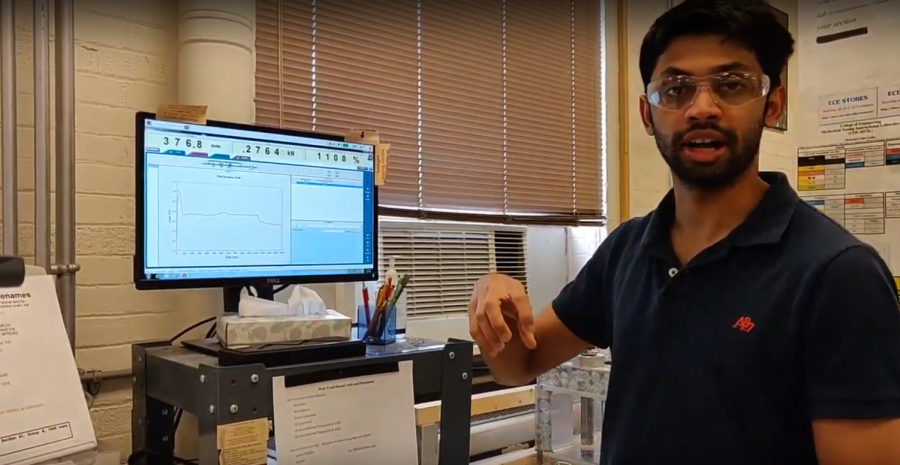Life in the lab lives on for graduate students
Photo Courtesy of Karthik Pattaje
Graduate student Karthik Pattaje explains the results of a lab he ran for a lecture video he and other TA’s are responsible for filming for online undergraduate classes.
Apr 8, 2020
As COVID-19 sent home a majority of the University’s student body, some students elected to stay in the Champaign-Urbana area during quarantine for a multitude of reasons. Some of these students include graduate and doctoral candidates working towards the completion of their advanced education while also continuously working to provide coursework for undergraduate students taking courses online.
Jamie Clark is a doctoral candidate in her 5th year of graduate school in the college of engineering. Clark is in the late stages of her doctorate and was only enrolled in one course this semester that previously only met on Fridays for an hour.
“The communication has been a little bit sparse; however, the way that they’ve done it this past Friday was that they released a PowerPoint that had some sort of voice recording attached to it and we filled out an activity sheet that went along with that voice recording,” Clark said.
Before the COVID-19 pandemic, Clark was in the middle of research for her dissertation, which included thesis work in the lab. However, research was made challenging when the pandemic began as Clark was completing her research in the concrete lab that requires a large amount of hands-on work.
When students were given the option to stay on campus or return home, the University sent out an email to graduate students and their advisers that set out guidelines for essential and nonessential research. If your research was deemed essential, you could continue to work in the lab under restricted hours.
Get The Daily Illini in your inbox!
“The boundaries between those two are very vague, and it’s kind of up to your adviser who has a lot of power to say what you can and cannot do,” Clark said.
Clark was allowed to continue her testing of cylinders that were already created occasionally.
“Our work is a little bit time-sensitive in that you have to test things one day, seven days, 28 days, 56 days to get an accurate representation of the behavior of our material,” Clark said.
Clark is currently staying in the C-U area where she is also working as an assistant lab manager at Talbot Lab. From campus, she has been running instructional, hands-on labs for undergraduate engineering students who are continuing their learning online.
“We’re still trying to put together instructional materials so that those students can continue their labs remotely,” Clark said.
Chuanyue Shen, a fourth-year graduate student in Engineering, decided to stay on campus during the pandemic to continue providing instruction and teaching as a teaching assistant for CEE 300: Behavior of Materials.
“We spend a lot of time editing the videos so the student can actually understand the procedures and details,” Shen said.
Since students transitioned to online learning, Shen and other graduate teaching assistants for engineering courses spend their time recording lab procedures and lecture videos for students to watch. When filming and editing the lab videos, Shen makes sure to be conscientious of the student’s time throughout the day.
“Students will get bored if they watch two-hour videos every week, so we try to condense the lab procedures to exclude the repetitive steps,” Shen said. “We only show unique steps and give very detailed instruction and information.”
Shen completes her lab recordings for her students from Talbot Lab. Throughout the week, the TAs have very limited access to the labs: only about a few hours one afternoon to complete the video recording.
“For this class, we only have two lab instructors,” Shen said. “We go there and record the labs and do the things on our own. There’s no other people involved in that.”
Karthik Pattaje, a fourth-year graduate student in Engineering, is also a TA for the CEE 300: Behavior of Materials course. Pattaje elected to stay on campus during the pandemic due to not being able to travel back to his home country of India.
Before the outbreak, Pattaje was responsible for teaching eight hours a week for four different lab sections. Now, he only needs to record a video from Talbot and upload the lab for students to view.
“The only good part about this whole thing is that my workload has reduced,” Pattaje said.
The teaching assistants and graduate assistants, along with professors in Engineering, met soon after the University moved to an online format to discuss how CEE 300: Behavior of Materials would be taught from an online platform, as it’s a very hands-on course.
In the course, students learn to deal with construction materials and see how they work under different loads and materials. The meeting allowed the group to determine when they would send out data from previous semesters to students as opposed to students attempting to create data on their own. This would have led to extremely similar data across the class.
“We do the experiment once, record the video and give it to them so they can see what’s happening,” Pattaje said. “We decided that’s the best thing to do, just asking them to read the lab manual and figure out what would’ve happened.”






